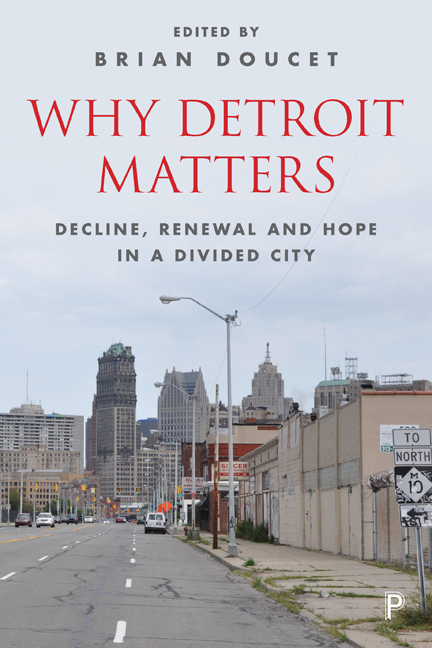Book contents
- Frontmatter
- Contents
- List of contributors
- List of figures and tables
- Acknowledgments
- one Introduction: why Detroit matters
- Section One Lessons from Detroit
- Intermezzo I You may not know my Detroit
- Section Two Practices from Detroit
- Intermezzo II My Detroit
- Section Three Conversations from Detroit
- References
- Index
nineteen - Eastern Market Corporation
Published online by Cambridge University Press: 05 April 2022
- Frontmatter
- Contents
- List of contributors
- List of figures and tables
- Acknowledgments
- one Introduction: why Detroit matters
- Section One Lessons from Detroit
- Intermezzo I You may not know my Detroit
- Section Two Practices from Detroit
- Intermezzo II My Detroit
- Section Three Conversations from Detroit
- References
- Index
Summary
Eastern Market was founded in 1891 and is one of the largest food markets in the US today. One of the reasons for that, as Dan Carmody will explain, is that similar markets in other cities have been gentrified out of existence. Eastern Market is spread over six blocks, with five principle structures. The Eastern Market district is a 400-acre local food district that includes numerous food wholesalers and producers, as well as other businesses. The Saturday market is open year round; during the summer, up to 40,000 people come to the market on Saturdays. There are seasonal retail markets on Tuesday and Saturday from June through September and there is also a wholesale market during Michigan's growing season.
Dan Carmody has been President of the Eastern Market Corporation for almost a decade. He moved to Detroit in 2007 after living and working in cities such as Chicago and Manchester, UK. He has dedicated his life to Rust Belt cities. Since 2006, the market has been run by the Eastern Market Corporation, a non-profit public–private partnership. It is still owned by the city, which appoints seven of the 21 members of its board.
Detroit is often referred to as a “food desert.” What are your thoughts on this term?
I don't like the term “food desert.” First, it's wrong to call Detroit a “food desert” when you have our market, as well as the Detroit Produce Terminal on the city's southwest side; both are portals through which some of the best food in the country enters Detroit. There is a rich selection of independent grocers in the suburbs; they have no problem coming into Detroit, picking up produce, and taking it back to the suburbs. “Food desert” doesn't convey the deviousness of how we devise a food system that can get really good-quality food near people with higher incomes, but not necessarily to neighborhoods near the market where people with low incomes reside. It also demonizes Michigan agriculture, which produces 150 different crops of food, which are not getting to our most vulnerable residents. It also belies the fact that there is plenty of bad food in those neighborhoods. “Food deserts” strike me as “we just need to get a bit more quality food and people will buy it.”
- Type
- Chapter
- Information
- Why Detroit MattersDecline, Renewal and Hope in a Divided City, pp. 297 - 302Publisher: Bristol University PressPrint publication year: 2017



